General events
advertisement
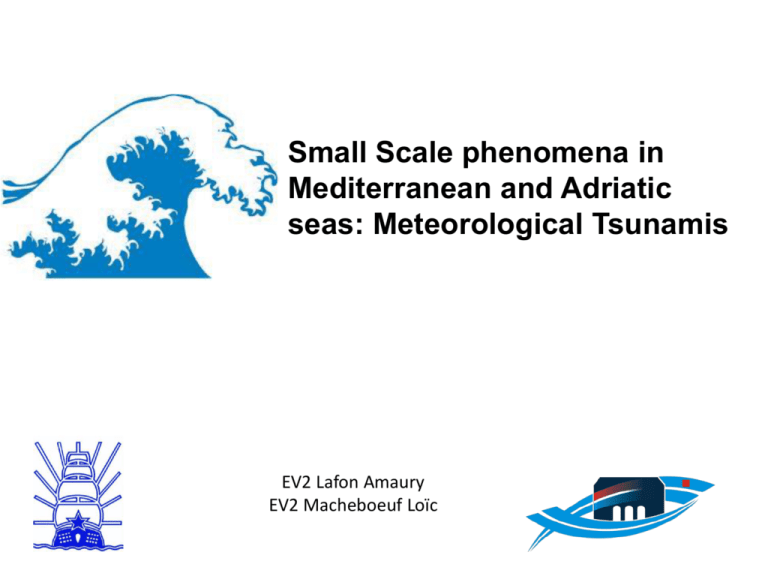
Small Scale phenomena in Mediterranean and Adriatic seas: Meteorological Tsunamis EV2 Lafon Amaury EV2 Macheboeuf Loïc Contents 1. Meteorological tsunamis 2. Materials and Methods 2.1 Sea level to sea height 2.2 Detetecting event 3.3 Summary 3. Analysis 3.1 Sea level analysis 3.2 Sea height analysis 4. General events 5. General synoptics 5.1 Spain 5.2 Sicily 6. Specific events Conclusion What are the atmospheric processes hold responsible for meteorological tsunamis in the western part of the Mediterranean Sea? An atmospheric disturbance with quick pressure jumps 1. Meteorological tsunamis 2. Materials and Methods 3. Analysis 4. General events 5. General synoptics 6. Specific events Conclusion Meteotsunamis A set of two resonances (external and internal resonances) a harbor, a bay or an inlet with the high Qfactor 1. Meteorological tsunamis 2. Materials and • Area of study: Mediterranean Seas. • 4 areas established upon geographical considerations Methods 2.1 Sea level to sea height 2.2 Detetecting event 3.3 Summary 3. Analysis 4. General events 5. General synoptics 6. Specific events Conclusion A B D C • Pre-processing (overlapping and missing data, unrealistic peaks, de-tided, linearly interpolated and 4-hour period Keiser-Bessel window filtered) • Sea height 1. Meteorological tsunamis 2. Materials and Methods 2.1 Sea level to sea height 2.2 Detetecting event 3.3 Summary 3. Analysis 4. General events 5. General synoptics 6. Specific events Conclusion Criteria of selection: • Maximum height of event • Duration of event • At least 3 station have to record the event 84 tide gauge stations • Sea level downloaded from IOC sea level monitoring website. 1. Meteorological tsunamis 2. Materials and Methods 2.1 Sea level to 72 tide gauge • Multimodal correlation stations used sea height 2.2 Detetecting event 3.3 Summary 3. Analysis • multisite aggregation 36 possible events 4. General events chosen 5. General synoptics 6. Specific events Conclusion • Synoptic condition downloaded from ECMWF ERAinterim website 33 events analyzed • MSLP, 850hPa temperature, 500hPa wind and Richard number 12 10 8 area A N° 1. Meteorological tsunamis 2. Materials and Methods 3. Analysis 3.1 Sea level analysis 3.2 Sea height analysis 4. General events 5. General synoptics 6. Specific events Conclusion area B 6 area C area D 4 all stations 2 0 1 2 3 4 5 6 7 8 9 10 11 12 month • Most of event in the Mediterranean Sea occurred during summer time. • One phenomenon is to be observed: Extreme peaks moves downtime as we go eastward. N° of event 4 1. Meteorological tsunamis 2. Materials and Methods 3. Analysis 4. General events 5. General synoptics 6. Specific events Conclusion 5 Name of stations date Catania 0,1492 Messina 0,1513 Crotone 0,0567 Otranto Bari 27/03/2014 0,1487 0,1387 Ortona 0,2347 Taranto 0,1023 Porto empedocle 0,3548 Lampedusa Palermo 11/04/2012 0,3364 0,1361 Napoli 0,2713 Centuri 2 0,0157 Solenzra2 0,2126 Ajaccio 2 0,0968 Ginostra (Isola di Stromboli) 20/11/2013 Ortona 0,2347 Porto empedocle 0,3548 Ginostra (Isola di Stromboli) 0,6765 Anzio 0,3638 0,6765 0,2083 Lampedusa 0,1156 Porto empedocle 0,2948 Solenzra2 0,307 Ajaccio 2 0,1152 Ile rousse 2 0,2068 Genova Maximum height 0,1121 Palermo Centuri 2 Station recording the maximum height 0,484 nice 17 0,2297 Vieste Centuri 2 13 Height recorded 04/07/2014 0,3021 0,1312 La Spezia 0,2162 Livorno 0,0127 Anzio 0,3638 1. Meteorological tsunamis 2. Materials and Methods 3. Analysis 4. General events 5. General synoptics 6. Specific events Conclusion 2 high-risk regions highlighted 1. Meteorological tsunamis 2. Materials and Methods 3. Analysis 4. General events 5. General synoptics 5.1 Spain 5.2 Sicily 6. Specific events Conclusion Mean Synoptic Conditions 1. Meteorological tsunamis 2. Materials and Methods 3. Analysis 4. General events 5. General synoptics 5.1 Spain 5.2 Sicily 6. Specific events Conclusion Mean Anomalies 1. Meteorological tsunamis 2. Materials and Methods 3. Analysis 4. General events 5. General synoptics 5.1 Spain 5.2 Sicily 6. Specific events Conclusion Mean Synoptic Conditions 1. Meteorological tsunamis 2. Materials and Methods 3. Analysis 4. General events 5. General synoptics 5.1 Spain 5.2 Sicily 6. Specific events Conclusion Mean Anomalies 1. Meteorological tsunamis 2. Materials and Methods 3. Analysis 4. General events 5. General synoptics 6. Specific events Conclusion 1. Meteorological tsunamis 2. Materials and Methods 3. Analysis 4. General events 5. General synoptics 6. Specific events Conclusion • Extreme peaks move downtime as we move to the East. • Some differences between areas: change of MSLP, depending of seasons. • Same atmospheric processes that can lead to meteorological tsunamis govern all the strongest events and most of other high-frequency sea level oscillations in the western part of the Mediterranean Sea: Atmospheric Gravity Waves
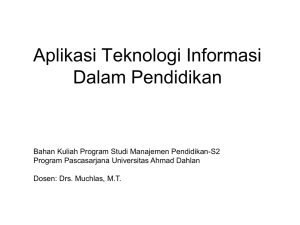
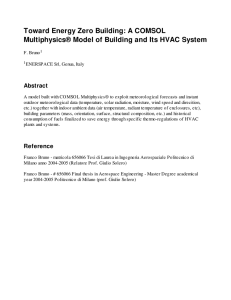

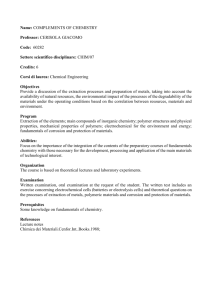
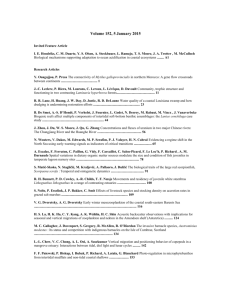
![Correlated leading baryon-antibaryon production in e+e--- >cc[over-bar]-->Lambda c+Lambda[over-bar]c-X](http://s2.studylib.net/store/data/012103429_1-0177181ec7d4b9e211534b248dccecc0-300x300.png)